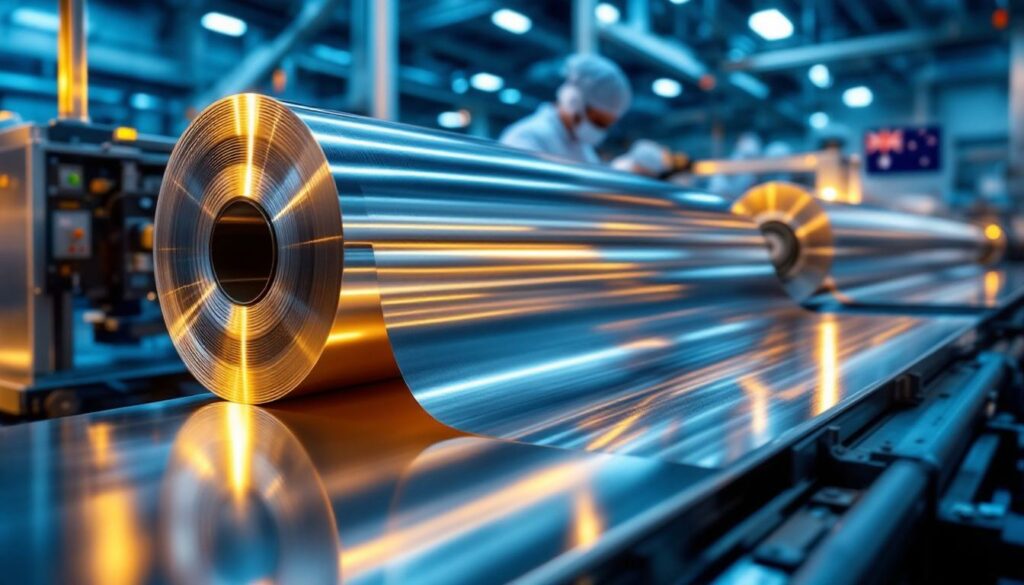The Revolutionary Impact of Lithium Metal Foils on Battery Technology
Australia's battery technology sector reached a significant milestone as Li-S Energy (ASX:LIS) became the nation's first company to successfully produce lithium metal foils domestically. This breakthrough, achieved ahead of schedule at their Geelong facility, represents a transformative shift in Australia's battery metals investment landscape and positions the country to compete in the high-tech energy storage space.
Understanding Lithium Metal Foil Technology
Lithium metal foil serves as a critical component in next-generation battery technologies, particularly for lithium-sulfur batteries. Unlike conventional graphite anodes used in lithium-ion batteries, these ultra-thin sheets of pure lithium metal enable significantly higher energy density and performance characteristics.
The foils produced by Li-S Energy feature a precise 100-micron thickness, manufactured through a specialized extrusion process at their Geelong battery cell production facility. This thickness specification is crucial for optimal electrochemical performance while maintaining physical stability within battery cells.
As Steve Rowlands, CTO of Li-S Energy explains, "By producing foils in-house, we have tighter control over thickness, purity, and handling conditions – all of which are critical to performance and safety." This level of quality control represents a fundamental advantage over imported alternatives.
Technical Insight: Lithium metal anodes offer theoretical specific capacities up to 3,860 mAh/g – approximately ten times higher than traditional graphite anodes used in conventional lithium-ion batteries.
The Strategic Importance of Domestic Lithium Foil Production
Australia has long held a dominant position in the global lithium supply chain as one of the world's largest producers of lithium raw materials. However, the country has historically relied on imported lithium foils for advanced battery research and manufacturing, creating a significant gap in the domestic value chain.
Li-S Energy's achievement effectively eliminates this import dependency, strengthening Australia's position in the complete battery manufacturing ecosystem. This vertical integration provides significant strategic advantages:
- Supply chain resilience: Reduced vulnerability to international shipping disruptions and trade uncertainties
- National security enhancement: Decreased reliance on foreign suppliers for critical energy technology components
- First-mover advantage: Established position as Australia's pioneer in this specialized manufacturing capability
Dr. Lee Finniear, CEO of Li-S Energy, highlighted the breakthrough's significance: "We're proud to be the first [Australian] company to produce lithium foils, a critical component for the future of high energy density batteries."
This domestic production capability not only supports Australia's internal battery industry but also opens export opportunities in the rapidly growing global market for advanced battery materials.
How Li-S Energy's Breakthrough Changes Battery Manufacturing
The shift from imported to domestically produced lithium metal foils represents a paradigm shift in Australian battery manufacturing capabilities, with wide-ranging implications for production efficiency, quality control, and overall industry competitiveness.
Technical Advantages of In-House Lithium Foil Production
In-house production delivers several critical technical advantages:
- Enhanced quality control: Direct oversight of the entire manufacturing process ensures consistent quality metrics
- Customization capabilities: Ability to adjust thickness, dimensions, and handling parameters for specific battery designs
- Reduced contamination risk: Elimination of exposure to environmental variables during international shipping
- Immediate implementation: Seamless integration with existing battery cell production lines at the Geelong facility
The ability to control these variables directly impacts the performance, safety, and longevity of the final battery products. As lithium metal is highly reactive with oxygen and moisture, maintaining pristine conditions throughout production and handling is essential for optimal performance.
Economic Impact of Domestic Production
Beyond technical benefits, the economic advantages of domestic lithium metal foil production are substantial:
- Reduced lead times: Elimination of international shipping delays (typically 4-8 weeks)
- Cost efficiencies: Avoidance of import duties, shipping costs, and currency exchange fluctuations
- Supply chain simplification: Direct material flow from production to implementation
- Export revenue potential: Opportunity to supply high-quality lithium foils to international markets
These economic benefits contribute directly to Li-S Energy's competitive position in the global battery technology race. The market's positive reaction was evident in the company's share price, which jumped an impressive 19.2% following the announcement.
Applications Benefiting from Advanced Lithium Metal Foils
The availability of domestically produced, high-quality lithium metal foils unlocks significant possibilities across multiple battery technologies and applications.
Lithium-Sulfur Battery Applications
Lithium-sulfur (Li-S) batteries represent one of the most promising next-generation energy storage technologies, offering theoretical energy densities up to 2,600 Wh/kg – nearly five times that of current lithium-ion batteries.
Key advantages of lithium-sulfur batteries include:
- Superior energy density: Potential for much lighter batteries with equivalent capacity
- Extended range: Particularly valuable for electric vehicles and aviation applications
- Reduced reliance on critical minerals: Less dependence on cobalt and nickel
- Lower environmental impact: Sulfur is abundant, inexpensive, and environmentally benign
The performance of these batteries depends significantly on the quality of the lithium metal anode, making Li-S Energy's manufacturing breakthrough particularly valuable for advancing this technology toward commercial viability.
Emerging Battery Technologies Enabled by Lithium Metal
Beyond lithium-sulfur configurations, high-quality lithium metal foils enable advancement in several other cutting-edge battery technologies:
- Solid-state batteries: Lithium metal anodes paired with solid electrolytes for enhanced safety and energy density
- Lithium-air batteries: Ultra-high energy density systems using oxygen from the atmosphere as a cathode reactant
- Hybrid battery-supercapacitor systems: Combined high energy and power density storage solutions
These technologies have applications across diverse sectors:
- Aerospace and defense: Lightweight, high-capacity energy storage for drones, aircraft, and portable military equipment
- Electric vehicles: Extended range and faster charging capabilities
- Grid-scale storage: More efficient renewable energy integration
- Consumer electronics: Longer-lasting devices in smaller form factors
Industry Insight: The global market for advanced battery raw materials update is projected to grow at a CAGR of over 8% through 2030, with lithium metal components representing a high-value segment within this expansion.
The Manufacturing Milestone Achievement
The successful production of lithium metal foils represents a significant technical achievement, requiring specialized expertise, equipment, and safety protocols.
Li-S Energy's Production Infrastructure
Li-S Energy's Geelong battery cell production facility serves as the cornerstone of this manufacturing breakthrough. The company strategically installed new extrusion equipment specifically designed for lithium metal processing, completing the implementation ahead of their projected timeline.
This facility now encompasses the complete production chain from raw lithium processing to finished battery cell assembly, creating an integrated manufacturing ecosystem that maximizes efficiency and quality control.
Key infrastructure elements include:
- Specialized extrusion equipment: Custom-designed for ultra-thin lithium metal processing
- Environmental control systems: Maintaining inert atmospheres to prevent lithium oxidation
- Quality assurance instrumentation: Real-time monitoring of thickness, purity, and surface characteristics
- Safety management infrastructure: Comprehensive systems for handling reactive metals
Technical Challenges Overcome
Working with lithium metal presents unique technical challenges due to its high reactivity and specific physical properties. Li-S Energy successfully addressed several key obstacles:
- Handling reactive lithium safely: Implementation of specialized inert atmosphere processing chambers and handling protocols
- Achieving consistent thickness: Development of precision extrusion techniques to maintain the critical 100-micron specification
- Surface quality control: Methods to prevent contamination and oxidation during manufacturing
- Scalability considerations: Balancing laboratory precision with commercial production volumes
The company's success in overcoming these challenges demonstrates significant technical expertise and innovation capability, positioning them favorably for future advancements in battery technology.
Future Roadmap for Li-S Energy and Lithium Metal Technology
Building on their manufacturing breakthrough, Li-S Energy has outlined an ambitious development roadmap to further enhance their lithium metal foil capabilities and expand their battery technology portfolio.
Future Development Plans
According to their announcements, Li-S Energy's next development phases include:
- Enhanced processing capabilities: Adding foil rolling, laminating, and coating technologies
- Product range expansion: Developing varied thicknesses and formats for different battery applications
- Nanomaterial scale-up initiatives: Integrating advanced nanomaterials with lithium metal foils
- Commercial partnership development: Collaborating with battery manufacturers and end-users
These initiatives aim to create a comprehensive ecosystem of advanced battery materials and technologies, strengthening Li-S Energy's position in the rapidly evolving energy storage market.
Market Impact and Investment Outlook
The market's response to Li-S Energy's announcement was decidedly positive, with the company's share price jumping 19.2% following the news. This strong investor reaction reflects confidence in both the technical achievement and its commercial potential.
Key factors driving investor optimism include:
- Competitive differentiation: Unique position as Australia's only lithium metal foil manufacturer
- Vertical integration advantage: Control over critical supply chain components
- Export potential: Opportunity to serve international markets with high-value materials
- Technology leadership: Demonstrated capability in advanced materials processing
As global demand for high-performance batteries continues to accelerate, companies with specialized manufacturing capabilities like Li-S Energy are positioned to capture significant market value.
Impact on Australia's Battery Industry
Li-S Energy's breakthrough has implications beyond the company itself, potentially catalyzing broader development in Australia's battery industry ecosystem.
Strengthening Australia's Advanced Manufacturing Capabilities
The domestic production of lithium metal foils represents a significant step toward a more complete battery manufacturing value chain in Australia. This advancement aligns with several national strategic priorities:
- Value-added processing: Moving beyond raw material extraction to higher-value manufacturing
- Advanced manufacturing development: Building specialized technical capabilities and infrastructure
- Skills and knowledge development: Creating expertise in high-tech materials processing
- Innovation ecosystem growth: Supporting related research and development activities
By demonstrating that specialized battery component manufacturing can be successfully implemented in Australia, Li-S Energy's achievement may encourage similar investments across the battery supply chain.
Global Market Opportunities
The breakthrough positions Australia to participate more actively in the global high-performance battery market. As Dr. Finniear noted, this development "opens doors" for export opportunities in high-purity lithium foils.
International market factors supporting this potential include:
- Growing demand: Accelerating adoption of electric vehicles and renewable energy storage
- Supply chain regionalization: Increasing preference for diversified, resilient supply networks
- Quality premium: Willingness to pay for higher-performance, more reliable components
- Strategic partnerships: Opportunities for collaboration with international battery manufacturers
By establishing early leadership in this specialized manufacturing niche, Australia can potentially secure a valuable position in the global battery supply chain beyond its traditional role as a raw material supplier.
FAQ: Lithium Metal Foils and Battery Technology
What makes lithium metal foils critical for next-generation batteries?
Lithium metal anodes offer theoretical energy densities up to ten times higher than graphite anodes used in conventional lithium-ion batteries. This dramatic improvement enables:
- Higher capacity: More energy storage in the same physical space
- Lighter batteries: Reduced weight for the same energy storage capability
- Enhanced performance: Potential for faster charging and higher power delivery
- Architectural flexibility: Enabling new battery designs and form factors
These advantages make lithium metal foils a foundational component for multiple promising battery technologies, including lithium-sulfur, solid-state, and lithium-air systems.
How does in-house production improve battery quality and safety?
In-house production provides several critical advantages for battery quality and safety:
- Quality control: Direct oversight of thickness, purity, and surface characteristics
- Handling optimization: Minimized exposure to moisture, oxygen, and contaminants
- Customization capabilities: Ability to tailor foil specifications to specific battery designs
- Immediate implementation: Reduced time between manufacturing and incorporation into batteries
As CTO Steve Rowlands emphasized, these factors are "critical to performance and safety" in advanced battery systems, where even minor variations can significantly impact functionality.
What are the environmental implications of local lithium foil production?
Domestic lithium metal foil production offers several environmental advantages:
- Reduced transportation emissions: Elimination of international shipping requirements
- Supply chain efficiency: Fewer handling steps and interim storage requirements
- Quality improvements: Potential for longer-lasting, more efficient batteries
- Circular economy potential: Opportunities for more efficient battery recycling breakthroughs
Environmental Note: While lithium metal production requires significant energy input, localized production can potentially utilize Australia's growing renewable energy resources, further reducing environmental impact.
How does this technology compare to conventional lithium-ion batteries?
Lithium metal anodes represent a fundamental shift from the graphite anodes used in conventional lithium-ion batteries:
| Characteristic | Conventional Li-ion (Graphite) | Lithium Metal Anode |
|---|---|---|
| Theoretical capacity | 372 mAh/g | 3,860 mAh/g |
| Energy density | 250-300 Wh/kg | Potential for 500+ Wh/kg |
| Cycle life | 1,000+ cycles | Currently limited (improving) |
| Safety | Well-established | Requires careful management |
| Manufacturing maturity | High-volume production | Emerging technology |
While lithium metal offers significant performance advantages, challenges in cycle life and manufacturing scalability are active areas of research and development.
What technical expertise is required for lithium metal foil production?
Manufacturing lithium metal foils requires specialized knowledge and capabilities across several domains:
- Materials science: Understanding lithium metal properties and behavior
- Process engineering: Designing and operating extrusion and handling systems
- Safety management: Protocols for working with highly reactive materials
- Quality assurance: Methods for verifying critical parameters and consistency
- Integration expertise: Connecting manufacturing with battery assembly processes
These specialized capabilities represent valuable intellectual property and competitive advantages for companies like Li-S Energy that have successfully developed them.
Conclusion: A Significant Step Forward
Li-S Energy's successful domestic production of lithium metal foils represents a meaningful advancement for both the company and Australia's broader battery technology ecosystem. By eliminating reliance on imported components and establishing in-house manufacturing capabilities, the company has strengthened its competitive position and opened new opportunities for innovation and commercialization.
As global demand for advanced battery technologies continues to accelerate, this manufacturing breakthrough positions Australia to move beyond its traditional role as a raw material supplier and participate in higher-value segments of the battery supply chain. The positive market response to the announcement suggests investors recognize both the technical achievement and its commercial potential.
Furthermore, the success of Li-S Energy represents a significant milestone in lithium industry innovations and may inspire further investments in direct lithium extraction collaboration technologies across the sector.
Disclaimer: This article contains information about emerging technologies and company developments that may involve forward-looking statements. Readers should conduct their own research and due diligence before making investment decisions based on this information.
Looking to Invest in the Next Lithium Battery Breakthrough?
Discovery Alert's proprietary Discovery IQ model instantly notifies investors about significant ASX mineral discoveries like Li-S Energy's lithium foil breakthrough, transforming complex data into actionable investment insights. Understand why major mineral discoveries can lead to substantial returns by exploring Discovery Alert's dedicated discoveries page.




